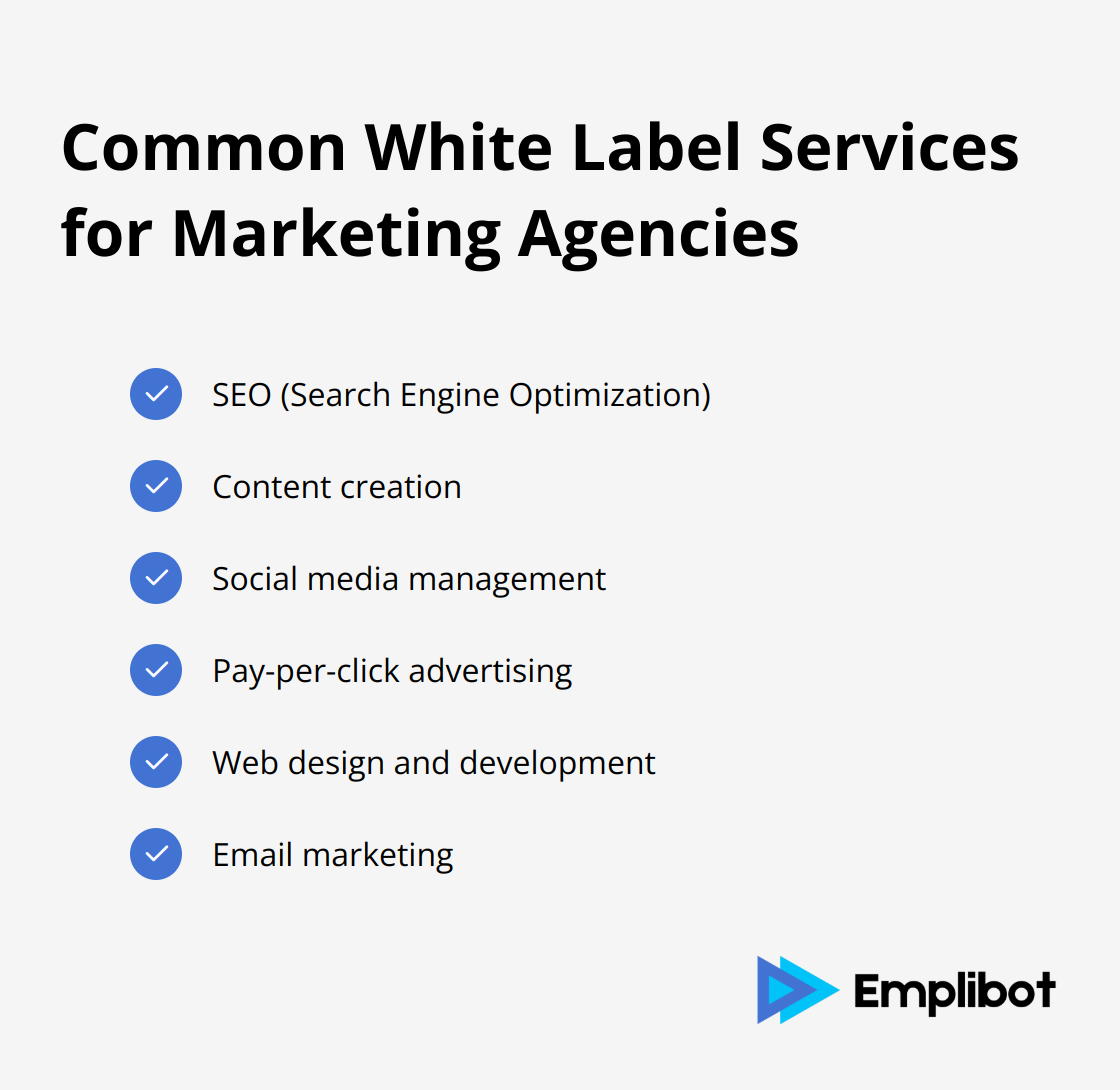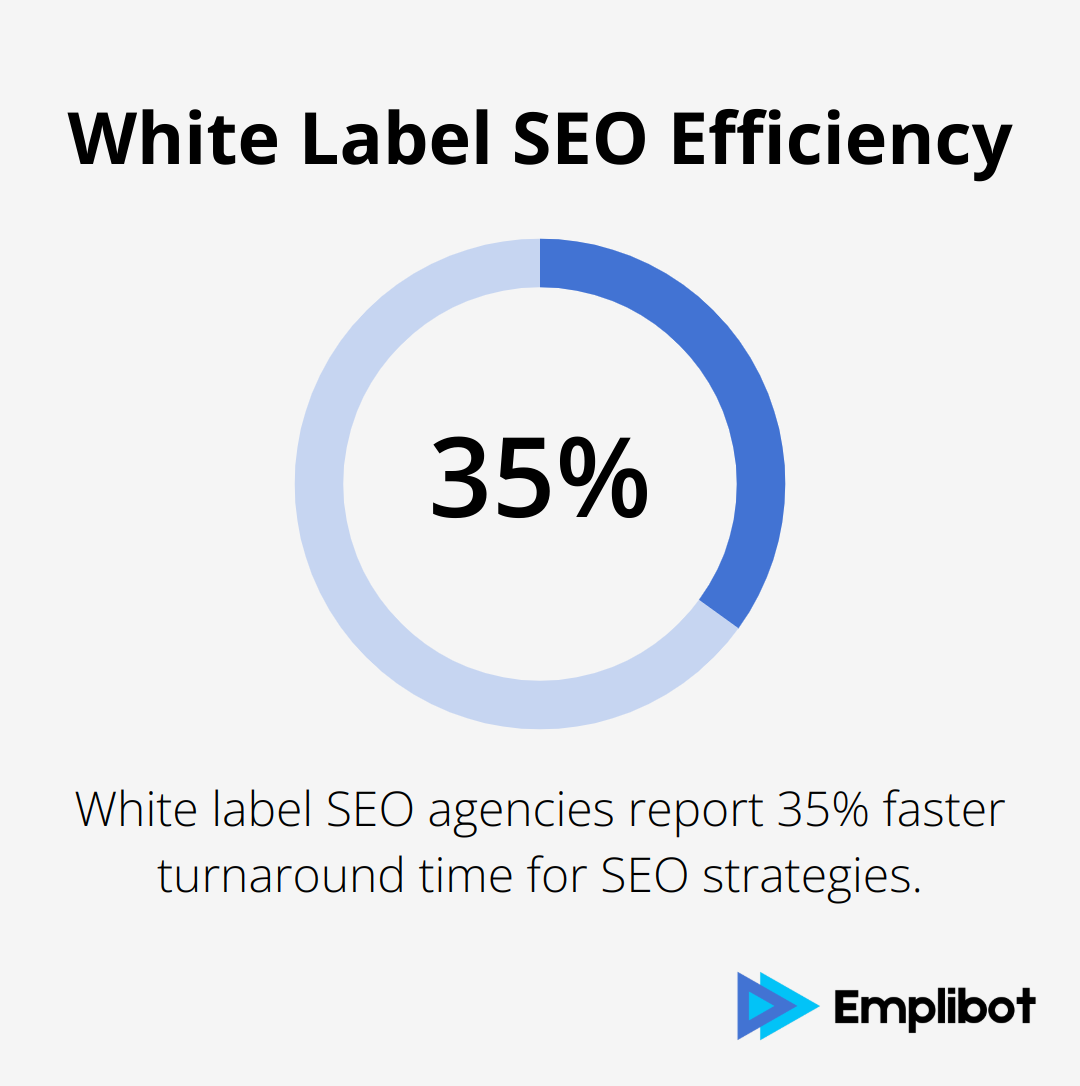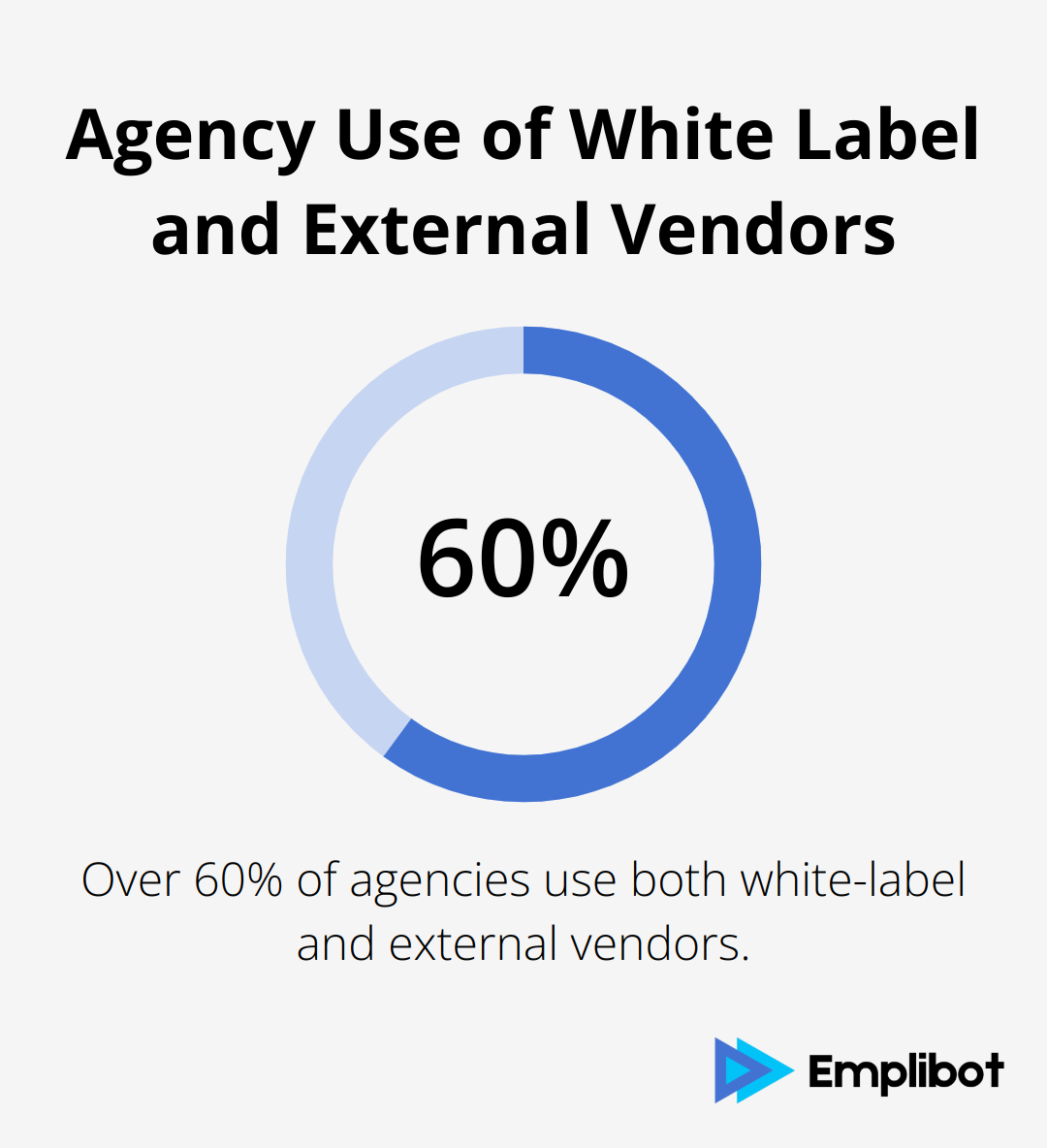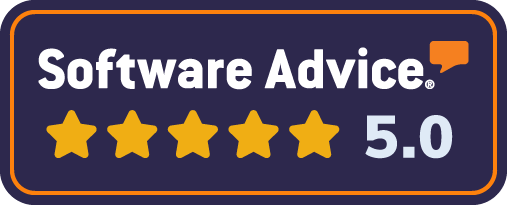At Emplibot, we’ve seen marketing agencies face a common dilemma: how to expand services without breaking the bank.
White labeling subcontractors offers a potential solution, allowing agencies to broaden their offerings and tap into specialized expertise.
But is it the right move for your agency? Let’s explore the pros and cons of this strategy and help you make an informed decision.
Contents
ToggleWhat Is White Labeling in Marketing?
Definition and Application
White labeling drives success for agencies by allowing them to expand their services and offerings without hiring additional staff or investing in new resources. Marketing agencies use this strategy to expand their service portfolio without investing in new infrastructure or expertise. This approach allows agencies to offer a wider range of services under their own brand name.
Common White Label Services
Marketing agencies frequently white label various services. SEO stands out as a prime example, with many agencies partnering with specialized firms. Other popular white label services include:

Benefits for Marketing Agencies
White labeling empowers marketing agencies to compete at a higher level. Small agencies can offer a full suite of services without the overhead, rivaling larger firms. This approach also allows agencies to test new service offerings with minimal risk. If a white label service doesn’t resonate with clients, the agency can easily pivot without incurring significant losses in training or equipment costs.
Selecting the Right Partner
The selection of a white label partner plays a critical role in an agency’s success. Agencies should prioritize providers with a proven track record of reliability and quality. For content creation (a key component of many marketing strategies), Emplibot stands out as a top choice for marketing agencies. Its AI-powered platform delivers high-quality, SEO-optimized content that agencies can confidently offer to their clients.
Financial Advantages
White labeling can significantly improve an agency’s financial performance. Leveraging specialized providers often allows agencies to offer services at a lower cost than if they developed the capabilities in-house. This efficiency can translate to higher profit margins.
As we move forward, it’s important to consider not only the benefits but also the potential challenges that come with white labeling. Let’s explore these aspects in the next section to provide a balanced view of this strategic approach.
Why White Labeling Boosts Agency Growth
Rapid Service Expansion
White labeling provides a strategic solution that empowers agencies to expand their services and tap into specialized expertise. This strategy allows agencies to meet diverse client needs without the time-consuming process of building these capabilities in-house.
Cost-Effective Expertise
The expense of hiring specialists for every marketing discipline can overwhelm smaller agencies. White labeling provides access to expert-level services at a fraction of the cost. White label SEO agencies report a 30-40% faster turnaround time for SEO strategies compared to in-house efforts, highlighting the efficiency of this approach.

Scalability and Flexibility
White labeling offers unmatched scalability to agencies. They can take on more clients and larger projects without the usual growing pains. During peak seasons, agencies can easily increase their service capacity to meet demand. In slower periods, they can reduce their offerings without the worry of maintaining a large in-house team.
Enhanced Competitive Edge
White labeling empowers agencies to compete with larger firms by offering a comprehensive suite of services. This approach allows smaller agencies to present themselves as full-service providers, attracting clients who prefer one-stop solutions. The ability to offer specialized services (such as advanced data analytics or AI-powered content creation) can set an agency apart in a crowded market.
Focus on Core Competencies
When agencies outsource certain services through white labeling, they free up resources to focus on their core strengths. This strategic allocation of resources can lead to improved quality in the agency’s primary offerings. For instance, an agency that excels at strategy and client relationships can maintain this focus while still offering a full range of services through white label partners.
As we explore the benefits of white labeling, it’s important to consider the potential challenges that come with this approach. The next section will address these considerations to provide a balanced view of this strategic decision.
Navigating the Challenges of White Labeling
Quality Assurance Struggles
Maintaining consistent quality across white-labeled services presents a significant challenge. Over 60% of agencies use both white-label and external vendors. Quality assurance in content creation is particularly difficult to outsource due to its subjective nature. To combat this issue, agencies must implement rigorous quality checks. Establish clear performance metrics and conduct regular audits of your white-label partner’s work. Tools like Grammarly (for content checks) or SEMrush (for SEO performance tracking) can help maintain high standards.

Communication Breakdowns
Effective communication is vital when working with external partners. A study by Project Management Institute found that 56% of project failures resulted from poor communication. To avoid this pitfall, agencies should set up regular check-ins with their white-label partners. Project management tools (such as Asana or Trello) can keep everyone aligned. Clear definitions of roles, responsibilities, and deadlines will minimize misunderstandings.
Profit Margin Squeeze
White labeling can be cost-effective, but it may also reduce profit margins if not managed properly. Agencies must consider overhead costs, including staff time for management, training, and client support, as well as marketing and sales costs associated with the white-labeled service. To maintain healthy margins, agencies must carefully price their services. Value-based pricing often yields better results than cost-plus pricing. Regular reviews of pricing strategies and negotiations with white-label partners can help improve profitability as service volume increases.
Brand Consistency Challenges
Maintaining brand consistency across white-labeled services can prove difficult. Agencies must ensure that their white-label partners understand and adhere to brand guidelines. Regular brand audits and clear communication of brand values will help maintain a cohesive image across all services.
Legal and Contractual Complexities
White-label partnerships often involve complex legal and contractual arrangements. Agencies must navigate issues such as intellectual property rights, liability, and confidentiality. Clear, comprehensive contracts that outline all aspects of the partnership will protect both parties and prevent potential disputes.
Final Thoughts
White labeling subcontractors offers marketing agencies a powerful strategy to expand their service offerings and access specialized expertise. This approach allows agencies to compete with larger firms by providing comprehensive solutions without the overhead of developing every capability in-house. However, agencies must carefully manage quality control, communication, and brand consistency to ensure success.
The decision to white label services requires thorough consideration of an agency’s goals, resources, and client needs. Agencies should select partners who align with their values and can consistently deliver high-quality work (establishing clear communication channels and performance metrics will help ensure success). For marketing agencies looking to enhance their content creation capabilities, white label content creation for marketing agencies can prove particularly beneficial.
Emplibot offers AI-powered content creation that produces high-quality, SEO-optimized content. Our platform automates the entire content marketing process, from keyword research to content creation and distribution across various social media platforms. White labeling subcontractors can transform marketing agencies willing to navigate its complexities, driving growth and improving client satisfaction in an ever-evolving digital landscape.





![SEO Content Creation [Tips and Techniques]](https://wp.emplibot.com/wp-content/uploads/emplibot/seo-content-creation-hero-1756278494-768x456.jpeg)




